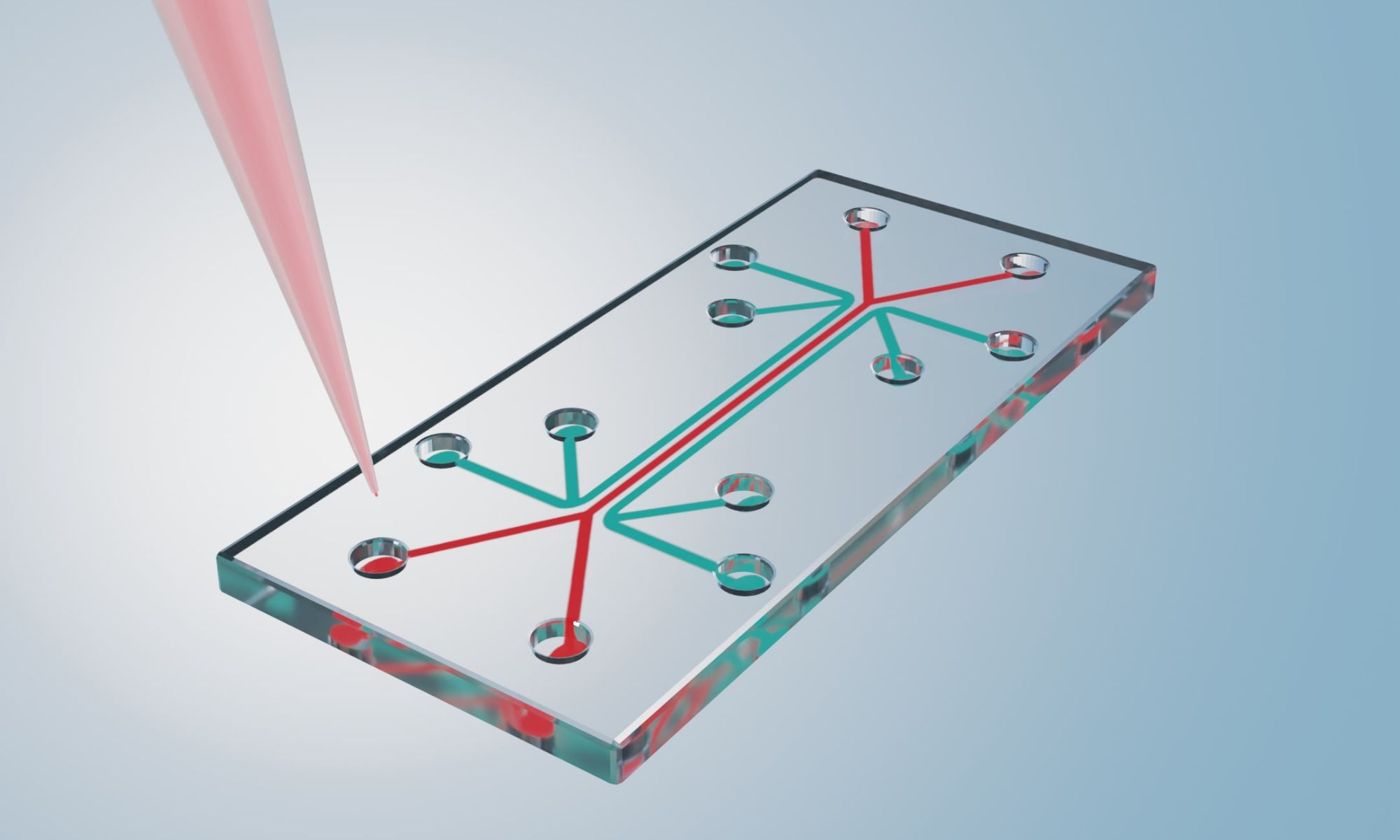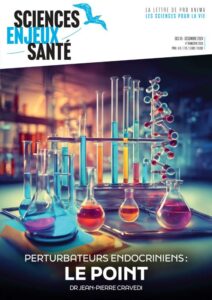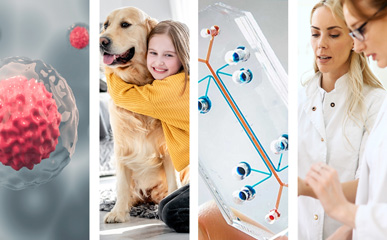
Standardisation of OoC technology, Google AI on board for medical research, Deep learning uncovers patterns in cancer patients, and more
News on non-animal methods
JANUARY 20 - 24, 2025NEWS, REPORTS & POSITION STATEMENTS
1. JRC roadmap for standardisation of OoC technology
At present, OoC technology is not fully integrated into drug development, chemical safety assessment, and clinical practice. For that to happen, standards are needed to ensure that devices are reliable and effective. Standardisation of Organ-on-chip (OoC) technology is an important step towards personalised medicine and animal-free testing. Standardisation will also support the development of a strong industrial ecosystem around this innovative biotechnology.
The Joint Research Centre (JRC) roadmap highlights the importance of a global endeavour to develop standards for OoC devices. To reach such a broad agreement, it suggests collaboration with the International Organization for Standardization (ISO), which has recently set up a new Subcommittee on ‘Microphysiological systems and Organ-on-Chip’.
2. Challenges and opportunities for validation of AI-based new approach methods
The integration of artificial intelligence (AI) into new approach methods (NAMs) for toxicology represents a paradigm shift in chemical safety assessment. Harnessing AI appropriately has enormous potential to streamline validation efforts.
A new review published in ALTEX explores the challenges, opportunities, and future directions for validating AI-based NAMs, highlighting their transformative potential while acknowledging the complexities involved in their implementation and acceptance. It also explores opportunities to use AI to simulate experiments, analyze complex biological information, and support validation of diverse NAMs and emphasizes the importance of collaboration among researchers, regulators, and industry to develop responsible AI use in toxicology.
3. Young TPI : empowering animal-free science among the next- generation of scientists
Promotion and encouragement for use of animal-free innovations among the next-generation of scientists, alongside knowledge acquisition and training in the increased capabilities of novel technologies, are fundamental for advancing science.
The Dutch government has promoted initiatives such as Transitie Proefdiervrije Innovatie (TPI) to make the public aware of the current situation. However, the transition towards animal-free innovations will span over more than two generations. In this context, Young TPI emerged as the-first-of-its-kind network comprising young professionals and students dedicated to revolutionizing scientific practices by catalyzing the shift towards animal-free research. Grounded on three pillars — collaboration, awareness-raising, and networking — Young TPI has evolved into a premier youth network in the Netherlands.
4. 10 OoC publications that defined 2024
2024 was filled with groundbreaking discoveries that showcase the transformative potential of Organ-on-a-Chip (OoC) technology. From uncovering new disease mechanisms to advancing drug safety and efficacy testing, these studies highlight the various ways that OoC are contributing to cutting-edge research.
The company Emulate has taken a closer look at ten of the most impactful OoC publications of 2024.
TOOLS, PLATFORMS, CALLS
5. Humane Research grants
The Humane Research Trust, a registered charity in the UK, provides the funding for scientists across the UK who need to develop alternatives to animals and animal products in medical research.
The Trust funds projects spanning a broad range of medical sciences, including rare diseases and other under-represented research fields. They provide funding opportunities to support researchers across the UK to develop cutting-edge humane research.
INDUSTRY, BIOTECH & PARTNERSHIPS
6. Servier brings Google AI on board for medical research
Determined to embed artificial intelligence, and more specifically generative AI, within its R&D on the Saclay plateau, the pharmaceutical group Servier is turning to Google — with whom it already has ties — for a new five-year agreement guaranteeing it access to AI solutions, notably the LLM Gemini family.
The pharmaceutical group claims to have identified some sixty use cases for AI. These include “identifying new therapeutic targets and screening (early research), increasing the probability of success, accelerating time-to-market, understanding the biological evolution of pathologies and drugs for formulation needs, developing precision medicine, digitizing clinical trials for recruitment and overall remote trial management”.
Read more (FR)
7. Sana reports promising results for type 1 diabetes islet cell transplants
Type 1 diabetes is an autoimmune disease in which the body’s immune system attacks and destroys insulin-producing beta cells in the pancreas, leading to an inability to regulate blood glucose levels. Islet cell transplantation aims to restore this function by introducing healthy, insulin-producing cells. However, the procedure traditionally requires immunosuppressive drugs to prevent the immune system from rejecting the transplanted cells.
Sana Biotechnology announced promising early results from a first-in-human study of its hypoimmune (HIP) technology for type 1 diabetes. The HIP platform is designed to enable transplanted cells to avoid immune detection, removing the need for immunosuppression. Conducted in collaboration with Uppsala University Hospital, the study data suggest that these cells can evade immune rejection, function effectively, and persist in patients.
8. Atropos Health partners with Merck to accelerate real-world evidence generation
Atropos Health has announced a collaboration with Merck to utilize its suite of tools for real-world evidence (RWE) generation, including the Atropos Evidence Network with 300 million patient records. The partnership focuses on rapid cohort creation, advanced analytics, and generating publication-grade RWE within 48 hours.
The announcement comes at a time when the pharmaceutical industry is grappling with challenges in data acquisition and representation. There is ongoing discussion that the bottleneck in leveraging AI for drug discovery and evidence generation is not primarily algorithmic sophistication but rather the availability, quality, and integration of domain-specific data.
SCIENTIFIC DISCOVERIES & PROTOCOLS
9. Deep learning uncovers histological patterns related to disease aggressiveness in cancer patients
Although recent studies have derived RNA-seq-based cancer signatures, there remains a need for a reproducible and cost-effective method to measure the pathway activation. In recent years, deep learning applied to histology slides have emerged as an effective way to predict molecular information from a data modality available in clinical routine.
In a recent study, researchers trained models to predict YAP1/TEAD activity — that is associated with tumor progression and resistance to chemotherapy — from H&E‑stained histology slides in multiple cancers. The robustness of the approach was assessed in seven independent validation cohorts. They showed that histological markers of disease aggressiveness were associated with dysfunctional Hippo signaling.
Read the publication in iScience
10. Poster : Adipose tissue organoid model from stromal vascular fraction
With more than 420 million Type 2 diabetes cases worldwide (expected to reach 1 Billion by 2030), and around 900 million obese patients in the world (expected to double by 2030), those two pathologies combined are considered the next pandemic by WHO and other health institutes.
To quickly develop new efficient treatments, new human-like models are needed. The startup CherryBiotech developed an “Adipose tissue organoid model from stromal vascular fraction” that offers an innovative in vitro model to replicate the complexity of adipose tissue. By using stromal vascular fraction (SVF) isolated from human adipose tissue, CherryBiotech proposes an alternative and human physiologically relevant in vitro model.
Read more and download the poster


